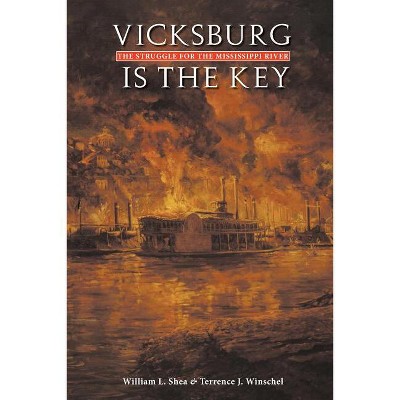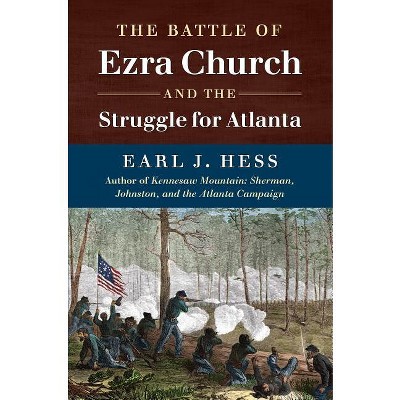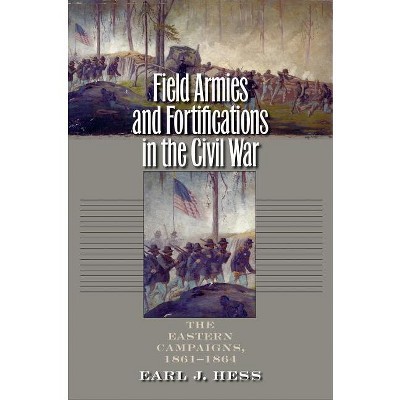Storming Vicksburg - (Civil War America) by Earl J Hess (Paperback)

About this item
Highlights
- The most overlooked phase of the Union campaign to capture Vicksburg, Mississippi, was the time period from May 18 to May 25, 1863, when Ulysses S. Grant closed in on the city and attempted to storm its defenses.
- Author(s): Earl J Hess
- 400 Pages
- History, United States
- Series Name: Civil War America
Description
About the Book
"Here Earl J. Hess offers an in-depth military history of a critical phase of the long federal campaign to capture Vicksburg, Mississippi during the Civil War. Hess focuses on the period from May 18-23, 1863, comprising the end of Ulysses S. Grant's overland march to the rear of the city and the beginning of his siege. These five days were a watershed in the development of Grant's eight months-long campaign to capture the Gibraltar of the Confederacy. His hope of ending the campaign quickly by assaulting the city's fortifications on May 19 and 22 were crushed by the failure of those attacks. The only recourse was a siege that extended federal operations against Vicksburg another six weeks"--Book Synopsis
The most overlooked phase of the Union campaign to capture Vicksburg, Mississippi, was the time period from May 18 to May 25, 1863, when Ulysses S. Grant closed in on the city and attempted to storm its defenses. Federal forces mounted a limited attack on May 19 and failed to break through Confederate lines. After two days of preparation, Grant's forces mounted a much larger assault. Although the Army of the Tennessee had defeated Confederates under John C. Pemberton at Champion Hill on May 16 and Big Black River on May 17, the defenders yet again repelled Grant's May 22 attack. The Gibraltar of the Confederacy would not fall until a six-week siege ended with Confederate surrender on July 4.
In Storming Vicksburg, military historian Earl J. Hess reveals how a combination of rugged terrain, poor coordination, and low battlefield morale among Union troops influenced the result of the largest attack mounted by Grant's Army of the Tennessee. Using definitive research in unpublished personal accounts and other underutilized archives, Hess makes clear that events of May 19-22 were crucial to the Vicksburg campaign's outcome and shed important light on Grant's generalship, Confederate defensive strategy, and the experience of common soldiers as an influence on battlefield outcomes.
Review Quotes
"Storming Vicksburg is a masterpiece from an exceptional historian."--North Carolina Historical Review
"Storming Vicksburg is based upon a large and richly diverse collection of primary and secondary sources. This mountain of material is skillfully incorporated into a comprehensive narrative account of the fighting, one that assesses the full breadth of command decisions and vividly records battlefield experiences of all ranks on both sides."--Civil War Books and Authors
"Storming Vicksburg tells the story of the most decisive struggle of the Civil War in vast detail and a splendid sweep of analysis." --Steven E. Woodworth, author of The Great Struggle: America's Civil War
"[Hess], author of Civil War Logistics, Civil War Field Artillery, and many other valuable works, gives a thought-provoking, insightful look at U.S. Grant's two unsuccessful attempts to storm Vicksburg before settling down for a protracted siege. . . . An excellent book."--NYMAS Review
"Earl Hess is one of the finest analysts of Civil War operations now at work. Historians have long tended to treat Grant's assaults against Vicksburg on May 19 and May 22 merely as a prelude to the lengthy siege that ensued. In this fascinating book, Hess demonstrates that the attacks deserve close attention in their own right and offers a measured reappraisal of both Grant and his Confederate counterpart, John C. Pemberton." --Mark Grimsley, author of The Hard Hand of War: Union Military Policy Toward Southern Civilians, 1861-1865
"Exceptional. . . . [T]horoughly researched and provide[s] detailed and compelling accounts of the battles of May 19 and 22 from the perspectives of both the high commands and the men at the proverbial tip of the spear."--Journal of Southern History
"Has deservedly reached the apex of Vicksburg scholarship to date and does justice to its author's historical acumen. Highly recommended for all U.S. Middle Period and Civil War historians and biographers, together with students of military command and field strategy."--Library Journal
"There is much to admire. . . . All in all, this is a fine work."--Emerging Civil War






